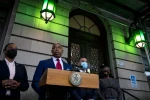By Jeff Coltin | NOVEMBER 2, 2020
When elected officials were brought up on the stage at the Oct. 17 Black Lives Matter rally in front of Trump International Hotel and Tower, Maya Wiley stayed planted on the asphalt. She isn’t elected to anything – yet – and her mayoral campaign is trying to present that as an asset, repeating the catchphrase, “I’m not a politician.” So while a top opponent in the race, New York City Comptroller Scott Stringer, spoke to the crowd, with another mayoral candidate, New York City Council Member Carlos Menchaca, standing behind him, Wiley talked with protesters.
It was a meeting of a national, intergenerational movement, viewed through a historic lens. Flyers read “From Eleanor Bumpurs” – killed in the Bronx in 1984 – “to Breonna Taylor” – killed in Louisville, Kentucky, in 2020. Hundreds of New Yorkers, most of them Black, joined activists that had come in from Louisville.
At one point, a man gestured Wiley over to a barricade beside the stage, and gave her something that might have been even more valuable than speaking time: a reminder of why she was running, why she was hoping to make history as the first Black woman – and the first woman at all – to become mayor of New York City.
The man talking to Wiley was Jacob Blake Sr., the father of the younger Jacob Blake, who was shot by a police officer in Kenosha, Wisconsin this August. “He looks me in the eye, and he says, ‘I am so proud of you,’” Wiley would recall, welling up with tears. While the rally went on around them, Wiley and Blake spoke about her work as a legal commentator on the cable news network MSNBC, and his fight pursuing punishment for the officer who shot his son. “His point is, ‘You are representing, and you’re doing it in a way that makes us feel heard,’” Wiley would say the next day. Wiley is a Black woman who has found huge platforms to talk about law and justice. And Blake was telling her that “I didn’t let him down. And that was probably the biggest compliment I could ever hope to have.”
Wiley stuck around for almost three hours, long after almost all the other politicians had left. The No Justice No Peace gospel choir from Louisville literally shook the stage as they sang. Wiley, backstage at this point, bounced up and down to the music, then pulled out her phone to take a video. “Are those my people? Yeah, those are my people,” Wiley said later. “We all have to see each other as, ‘We’re all our people,’ … but there is something that is very powerful and important about the Black experience in this country that transcends geography. That transcends even class.”
Combating systemic racism and police brutality is a top issue in the mayoral race, and Wiley is an expert on the subject. She’s a one-time civil rights attorney with the American Civil Liberties Union and the NAACP Legal Defense Fund, and the former chair of the Civilian Complaint Review Board, the body that evaluates claims of violence and other misconduct by New York City Police Department employees. It’ll be a central tenet of Wiley’s campaign – “There’s no leading this city out of the crisis we’re in without transforming policing,” she said.
Wiley could carry that message to victory – just like New York City Mayor Bill de Blasio did in 2013, vowing to end the targeting of racial minorities with stop-and-frisk policing. Wiley worked directly for de Blasio for two and half years as counsel to the mayor, and her campaign, which is staffed by some close allies to the mayor such as his former intergovernmental affairs director Jon Paul Lupo, has started out strong. Wiley is well-known among many New Yorkers who are plugged into national politics for her frequent criticism of President Donald Trump on MSNBC and Twitter – a platform where she has more than 371,000 followers. As a Black woman from Brooklyn who’s popular among highly engaged progressives in and out of the de Blasio orbit, she could be well-positioned to replicate the mayor’s feat of assembling a coalition of Black New Yorkers and liberal reformers of all races. Day one endorsers at her widely covered campaign launch included Bronx Assembly Member Michael Blake, who is a vice chair of the Democratic National Committee, and state Senate Deputy Majority Leader Michael Gianaris, a progressive stalwart from Queens.
“To my fellow Democrats,” Blake said at her announcement, “we can’t say that Black women are the backbone of our party, but you won’t support them to be mayor of New York City.”
But she faces some obstacles, and repeating de Blasio’s strategy may be harder after his two terms. The mayor’s relationship with those who want a smaller and more accountable NYPD has soured, and some leaders in the movement are hesitant to trust any candidate who worked closely beside de Blasio. Wiley’s time at the CCRB was criticized by some civil libertarians for failing to do more to rein in the NYPD.
Black women in politics warn she will be held to an unforgiving standard that de Blasio wasn’t in 2013. “Because she has the record of the CCRB, because of her record at the NAACP and all this, she will be judged differently,” Yvette Buckner, a political consultant at Tusk Strategies, said. “Black women always have to do twice as much to get half as much. So she will be judged differently regardless.”
Leaders of the police reform movement are withholding judgment, eager to hear more from Wiley. “I think she has an impressive social justice record,” said Joo-Hyun Kang, director of Communities United for Police Reform Action Fund. “That doesn’t translate necessarily into credibility as a mayoral candidate or as mayor, in terms of the NYPD.”
“We can’t say that Black women are the backbone of our party, but you won’t support them to be mayor of New York City.” – Assembly Member Michael Blake
Read More @ Source


